James’s blog
Anna vs Anna
2 Feb 21 | Re: Fictional foreign name pronunciation | Link-U-Post
Note: This post only applies to the UK, not America. Americans will gain nothing from reading it, and are not allowed to do so. If you are American and you read past here, you have to send me 50p in the post. If you tell me to "Let it go" it's a pound extra.
Among people who have children, heated arguments are breaking out over the pronunciation of Anna from Frozen. I naturally want to pronounce it the usual English way, to rhyme with spanner, but sometimes I get corrected: Anna from Frozen has a long a, like the a in palm. Am I wrong? Are they?
The reason for the palm pronunciation is that Anna comes from a non-English speaking country somewhere in Europe but appears in an American film, and Americans have a convention that the short a sound in European words should be pronounced as a long a. Where in Europe doesn't matter. 'Pasta' is a good example: Americans generally say it with a long a, and the fact that Italians don't is irrelevant. I don't know where the rule comes from but it exists. Interestingly, when Americans spell this pronunciation out phonetically they tend to write the long a sound as an o. So when they pronounce Anna from Frozen, it's possible that they are thinking 'Onna'.
English people don't have this rule. We either pronounce foreign words as if they were English, or make a sometimes laborious effort to pronounce them the way they're said in the original language. Which one we do depends on the person, on how established the word is in English, and on how close the home pronunciation is to a theoretical English one. With pasta there is no dilemma since the Italian pronunciation happens to be pretty close to what it would be in English (though I've never heard anyone do the Italian t), but words like pizza and roulade have developed a standard English version that's fairly close to their home pronunciation. Chorizo is all over the place, still too new to have settled properly.
Names are a bit different. Following the example of BBC Sport commentators, we do generally make an effort to say foreign names the foreign way. David is a good example: Spanish Davids like David Villa get the short a. However, you have to make the distinction between following the pronunciation of the origin language, and trying to do the accent. Spanish Davids, to use the same example, don't usually get the Spanish v that sounds like a b, because that would be doing the accent. Doing the accent is a trap to be avoided at risk of sounding like the kind of person who says "Bahrthelonna" (and that pronunciation is offensive anyway because it's the Castillian one, erasing Catalan identity).
So the Anna question boils down to whether the long a is a distinct pronunciation element from the Arendelle version of the name, or a question of accent. I think it's the latter, for a couple of reasons. First there are plenty of words in English that can be said with either of these two a sounds (grass, glass, class, bath). Second, in the real world Anna is a pan-European name that is well recognised in Italy, Denmark, Poland, Russia, Portugal, Hungary and many more countries. I've never heard any other European Anna, whether Karenina, Kournikova, de' Medici, Chakvetadze or anyone else, given the Frozen pronunciation - we just say it the English way. It's a bit like Paul: most English people wouldn't pronounce the first name of Paul Cezanne, Klee or Pogba in an obviously French or German way.
Now we don't know exactly where Arendelle is meant to be, so we can't ever know the correct Arendelle pronunciation (ie whether the Americans are getting it wrong in their own film). A bit of research on forvo.com focusing on cold, northern countries shows that while Swedish and Danish seem to have a pretty clear short a, Finnish has a long one, so the question must remain unsolved. But for English people I think the paragraph above gives a pretty clear case for trusting my instinct and continuing to rhyme with spanner.
In conclusion, you can say it however you like but (1) don't correct me because I'm not wrong and (2) if you pronounce it like in the film you are being American.
Posted by ZACKRY at 22:16
[Or dive into the blarchive...]
